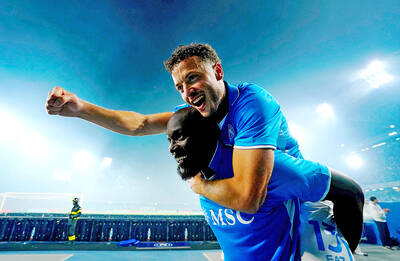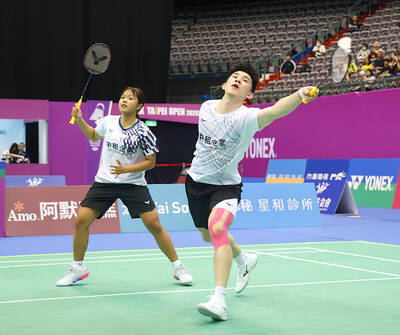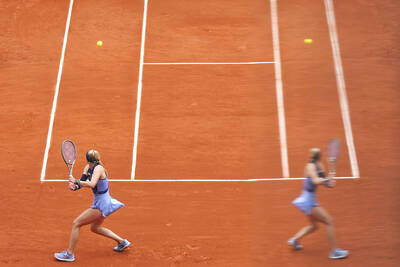Beneath soccer's image of fitness and heartiness lies a less healthy reality, say medical investigators, who have found that for fragile spectators, a match can quite literally be a sudden-death playoff.
Doctors eyeing the Euro 2008 championship are bracing for a rise in emergency calls, cardiac arrests, wife beatings, punchups, drunken driving, depression, self-harm and even suicide.
“The more important the game, the greater the risk” says Ute Wilbert-Lampen, an investigator at the Munich University Clinic in southern Germany.
During the 2006 World Cup, her team discovered, cardiac arrests and palpitations among men in the greater Munich area more than tripled compared with the same period over three preceding areas.
Among women, the rate was double.
The number of cases surged when Germany played and peaked massively in the quarter-finals against Argentina, which the national team won, and in the semis against Italy, which it lost.
Both games were decided after extra time and the penalty shootout, which previous research has already fingered as a risk.
The figures are so alarming that some experts urge people with a potential risk to take stress receptor blockers, aspirin and statins, or even consider behavior therapy to calm down before hitting the sofa.
“We advise our patients not to watch important matches after a heart attack or if they are considered to be a high cardiac risk,” said Herve Douard, a cardiologist at the University Hospital Clinic in Bordeaux.
Researchers at the University of Birmingham, in central England, suggested in all seriousness that penalty shootouts be abolished “on public health grounds” after discovering that the number of heart attacks in Britain rose by 25 percent on the day England lost to Argentina on kicks in the 1998 World Cup.
Another threat to life and limb is from domestic violence.
According to figures by Britain’s Home Office, cases of wife beatings in England and Wales surged on the day of each of England’s five games in the 2006 tournament, with a high of 31 percent over the normal rate.
Although it may seem counter-intuitive, soccer-related violence seems to rise when a team wins, rather than when it loses, says Vas Sivarajasingam of Cardiff University Wales, who looked at the city’s emergency room admissions when the national side played.
Every big sporting fiesta brings with it a rise in beer-fuelled car smashups, of accidents or acts of self-harm involving high-spirited or depressed fans.
One extreme example occured in February 2005, when a celebrating Welsh fan cut off his own testicles to fulfill a pledge after his side beat England in the Six Nations rugby tournament.
Then there are the longer-term health problems of the soccer fan’s couch-potato lifestyle: non-stop boozing and snacking on starchy, fatty, salty or sweet foods.
Alcoholism, obesity, diabetes and heart disease are entrenched problems in Europe, and Jeff Collin, a University of Edinburgh lecturer, blasts UEFA for accepting tournament sponsorship from Carlsberg, Coca-Cola and McDonald’s, who sell beer, soda and hamburgers.
“It’s fundamentally inappropriate for such events to be used primarily as a means of advertising unhealthy products, particularly when you take into account the scale of public subsidy that’s typically associated with them,” he said. “Using public money to advertise McDonald’s doesn’t seem a particularly appropriate stategy for promoting public health.”

TIGHT FINISH: Napoli only needed to do the same as or better than Inter, who won their game against Como 2-0 on the same day, leaving Napoli with a one-point lead The two players who Antonio Conte wanted more than any others secured Napoli their second Serie A title in three years on Friday. Scott McTominay scored with an acrobatic bicycle kick before halftime and Romelu Lukaku doubled the lead with a solo goal after the break in the decisive 2-0 home win over Cagliari. Conte became the first coach to win the Italian championship with three different teams. “Everyone contributed to this — but the coach most of all,” Napoli captain Giovanni Di Lorenzo said. “Napoli needed him to get back on top. He’s phenomenal.” Comparing it to his three Serie A titles won

The journey of Taiwan’s badminton mixed doubles duo Ye Hong-wei and Nicole Chan at the Malaysia Masters in Kuala Lumpur came to an end in the semi-finals yesterday after they suffered a 2-0 loss to China’s Feng Yanzhe and Huang Dongping. Ye, 25, and Chan, 20, teamed up last year and are currently ranked No. 23 in the world. The Taiwanese shuttlers took on China’s second seeds in the mixed doubles event, but proved no match for Feng and Huang, losing the match 10-21, 7-21. In the first half of the first game, the pairings were neck and neck at 6-7 until Ye

SSC Napoli coach Antonio Conte has dragged the team back from disaster and restored them to the top of Italian Serie A, but his future at the Scudetto winners is in doubt even after a triumphant season. The fiery 55-year-old has exceeded preseason expectations and bolstered his reputation as a serial winner by guiding Napoli to their fourth Scudetto, and second in three seasons. However, he might well be on his way in the summer after just one season at the helm as his charged relationship with Napoli owner Aurelio De Laurentiis has simmered throughout the campaign. Conte has said

Carlos Alcaraz on Monday powered into the French Open second round with a resounding win to start his title defense, while world No. 1 Jannik Sinner and three-time defending women’s champion Iga Swiatek also progressed at Roland Garros. Four-time Grand Slam champion Alcaraz struck 31 winners in a 6-3, 6-4, 6-2 victory over Italian qualifier Giulio Zeppieri and is to face Hungary’s Fabian Marozsan in round two. Alcaraz is now on an eight-match winning streak at the French Open and also took Olympic silver at Roland Garros last year, losing the final to Novak Djokovic. “The first round is never